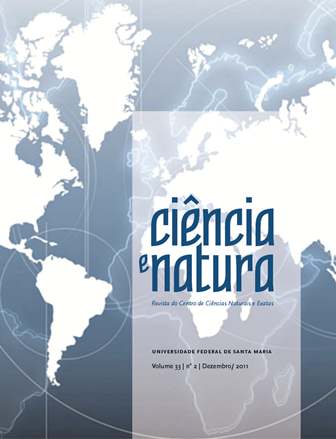Estrutura de uma Floresta de Mangue na Baía da Babitonga, São Francisco do Sul, SC
DOI:
https://doi.org/10.5902/2179460X9362Resumo
Os manguezais do entorno da baía da Babitonga representam os maiores remanescentes desse tipo de vegetação no estado de Santa Catarina, mas encontram-se seriamente ameaçados pela expansão urbana. Um trecho de manguezal nessa região teve sua estrutura analisada em uma área amostral de 1.300m2 de manguezal onde foram incluídos na amostragem todos os indivíduos arbóreos com CAP?10cm (ou DAP?3,8cm). Laguncularia racemosa foi a espécie com maior valor de importância na comunidade (VI= 60,3%), seguido de Rizophora mangle (VI= 20,13%) e Avicennia schaueriana (VI= 16,58%). Testes de comparação de médias revelaram que não houve diferenças significativas quanto ao DAP entre essas populações, porém, houve diferença quanto à altura. O mangue apresentou uma densidade estimada em 5.916 ind.vivos.ha-1, 2,44m2 de área basal, uma altura média de 3,62m e DAP médio de 4,27cm. De forma geral, a composição florística e a estrutura do manguezal avaliado tiveram muita relação com outros manguezais da região sul da baía da Babitonga, e permitiram inferir que o manguezal encontra-se em estágio médio de sucessão. A mudança do solo de um substrato mais arenoso para mais argiloso foi o fator que acarretou na variação da densidade das espécies.Downloads
Downloads
Publicado
Como Citar
Edição
Seção
Licença
Para acessar a DECLARAÇÃO DE ORIGINALIDADE E EXCLUSIVIDADE E CESSÃO DE DIREITOS AUTORAIS clique aqui.
Diretrizes Éticas para Publicação de Revistas
A revista Ciência e Natura está empenhada em garantir a ética na publicação e na qualidade dos artigos.
A conformidade com padrões de comportamento ético é, portanto, esperada de todas as partes envolvidas: Autores, Editores e Revisores.
Em particular,
Autores: Os Autores devem apresentar uma discussão objetiva sobre a importância do trabalho de pesquisa, bem como detalhes e referências suficientes para permitir que outros reproduzam as experiências. Declarações fraudulentas ou intencionalmente incorretas constituem comportamento antiético e são inaceitáveis. Artigos de Revisão também devem ser objetivos, abrangentes e relatos precisos do estado da arte. Os Autores devem assegurar que seu trabalho é uma obra totalmente original, e se o trabalho e / ou palavras de outros têm sido utilizadas, isso tem sido devidamente reconhecido. O plágio em todas as suas formas constitui um comportamento publicitário não ético e é inaceitável. Submeter o mesmo manuscrito a mais de um jornal simultaneamente constitui um comportamento publicitário não ético e é inaceitável. Os Autores não devem submeter artigos que descrevam essencialmente a mesma pesquisa a mais de uma revista. O Autor correspondente deve garantir que haja um consenso total de todos os Co-autores na aprovação da versão final do artigo e sua submissão para publicação.
Editores: Os Editores devem avaliar manuscritos exclusivamente com base no seu mérito acadêmico. Um Editor não deve usar informações não publicadas na própria pesquisa do Editor sem o consentimento expresso por escrito do Autor. Os Editores devem tomar medidas de resposta razoável quando tiverem sido apresentadas queixas éticas relativas a um manuscrito submetido ou publicado.
Revisores: Todos os manuscritos recebidos para revisão devem ser tratados como documentos confidenciais. As informações ou ideias privilegiadas obtidas através da análise por pares devem ser mantidas confidenciais e não utilizadas para vantagens pessoais. As revisões devem ser conduzidas objetivamente e as observações devem ser formuladas claramente com argumentos de apoio, de modo que os Autores possam usá-los para melhorar o artigo. Qualquer Revisor selecionado que se sinta desqualificado para rever a pesquisa relatada em um manuscrito ou sabe que sua rápida revisão será impossível deve notificar o Editor e desculpar-se do processo de revisão. Os Revisores não devem considerar manuscritos nos quais tenham conflitos de interesse resultantes de relacionamentos ou conexões competitivas, colaborativas ou outras conexões com qualquer dos autores, empresas ou instituições conectadas aos documentos.






